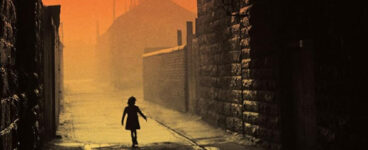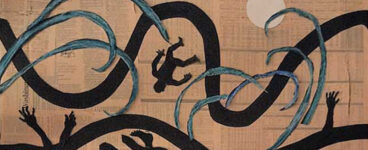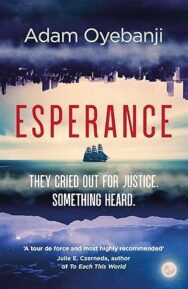‘If you think about it, a thriller is almost always dark. People are murdered, planes crash, buildings explode, submarines get crushed like cans as they sink to the bottom of the sea. None of this is actually fun. But the intensity of the thriller, the pace of it, carries the reader along, breathlessly enthralled.’
Esperance is a history-bending speculative fiction novel that’s pacy and thrilling, exploring impossible-seeming murders. We chatted to Adam about the book and about his thoughts on the craft of writing.
Esperance
By Adam Oyebanji
Published by Arcadia
Hello Adam, it’s great to have you back here on BooksfromScotland with your new novel, Esperance. Can you tell us a little bit about it?
Detective Ethan Krol is on the twentieth floor of a Chicago apartment building. A father and son have been found dead, their lungs full of sea water—hundreds of miles away from the ocean.
Abidemi Eniola has arrived in Bristol, England. She claims to be Nigerian, but her accent is wrong and she can do remarkable things with technology, things that her new friend, Hollie Rogers, has never seen before. Abi is in possession of a number of heirlooms that need to be returned to their rightful owners, and Hollie is more than happy to go along for the ride.
But neither Abidemi Eniola nor her heirlooms are quite what they seem. Abi is a target of Ethan Krol’s investigations, and Hollie’s life is about to become far stranger than she bargained for. In a clash of cultures, histories, and different ideas about justice, the consequences will be deadly.
This is a story about a cop who’s in way over his head, chasing a seemingly superpowered criminal dead-set on writing an old wrong, and a woman out of her own time and place prepared to do drastic things in expiation of sins that are not yet her own.
Also, I get to set some of the story in Edinburgh!
We know you better as a thriller writer with your Quiet Teacher series, but Sci-Fi is where you started out as a writer. How was it returning to the genre, and what was the genesis of Esperance?
I feel like less of an impostor when I write sci-fi, so returning to it is like coming home for me. As for how Esperance came about, I’m a lawyer. I went to law school at a time when law reports were read from books rather than computer screens. As an inveterate browser, I would often end up reading unassigned texts—little slices of history— from hundreds of years ago. On one particularly rainy day, I stumbled across a shipping case from the Eighteenth century that was such a stunning mix of incompetence and cruelty that it’s been at the back of my mind ever since. Not so long ago, I was literally staring out into the street with a cup of tea in my hand when I had a thunderclap of inspiration (not how it usually works!), and Esperance was born.
There is a crime and mystery element to Esperance, though, and adding in the sci-fi elements should mean that you have fewer constraints on how your mystery can be solved. Or does having an ‘anything is possible’ approach to crime solving bring its own issues?
Okay, I want to make one thing very clear: anything is not possible when adding speculative elements to what is an otherwise ‘conventional’ crime thriller. There have to be rules! Rules which the reader must understand and the author must follow. Otherwise the solution to the mystery will not flow from the story the reader read, and you will have abused the goodwill of someone who was kind enough to give up four hundred pages of their time to be with you. I’m a big believer in fair play when it comes to crime writing, so pulling some anything-is-possible-type rabbit out of the hat at the last minute is a big no-no for me.
One second while I descend from my soap box . . .
To answer your question—and as you have probably deduced from the preceding rant—the challenge here is to craft speculative elements that makes sense to the reader, and you do that by making sure that your speculative world is rules-based and internally coherent. Then—and this is where it gets really difficult—you have to explain those rules to the reader without giving them a lecture. Otherwise it’s, well, a lecture, and no one wants that when they’re reading a novel. In the end, the world your reader inhabits will have advantages and disadvantages, same as any other.
Think about mobile phones, a pain point for crime writers of a certain age who remember a world without them. Have they changed how mysteries get solved? Absolutely. Have they abolished mysteries? Absolutely not. Certain things become possible in a world with mobile phones and other things become impossible. However technologically advanced a world becomes there are always limits, and the writer who forgets that is in trouble.
It’s quite clear from when we first meet her that your character of Abi Eniola is not who she seems. Did you have fun inventing her? Is she a character you could return to in future books?
I had an absolute blast writing Abi. An outsider with attitude, let’s say! I would never turn down an opportunity to revisit a character like that, but it would have to be the right story. I wouldn’t want to force it.
Your novels are always full of snappy dialogue. Is dialogue one of your favourite writing elements?
Thank you! What a lovely thing to say!
I do enjoy writing dialog, probably because it’s the thing that feels most natural to me. I was always the snarky kid who answered back in the playground, so that back and forth on the page is something I’ve been doing for a very long time. On top of that, I spent many years of my life knocking around courtrooms. In court, we tell stories by conversation. I ask, you answer. If I’ve done my job well, by the time the conversation is over, the story we’ve been trying to weave has settled deep in the mind of judge and jury. My books have a lot of dialog, I suspect, because it’s become my default way of spinning a yarn.
The backdrop of your mystery is the Transatlantic Slave Trade. How did you tackle balancing covering such serious subject matter with the desire to write an entertaining, pacy novel?
By not overthinking it and concentrating on writing a crime thriller. Thrillers, whether speculative or otherwise, are often fun, light and pacy. It doesn’t mean that they avoid the hard, dark subjects. In fact, done properly, it’s those ‘unserious’ qualities that make thrillers the perfect vehicle for difficult issues. Because thrillers can reach people who simply aren’t responsive to heavyweight tomes and who hate being lectured.
If you think about it, a thriller is almost always dark. People are murdered, planes crash, buildings explode, submarines get crushed like cans as they sink to the bottom of the sea. None of this is actually fun. But the intensity of the thriller, the pace of it, carries the reader along, breathlessly enthralled. And thriller writers understand that, as in real life, dark and light often go hand in hand. Some scenes in Esperance are out and out comedic, but they’re the spoonful of sugar that helps the rest of the book go down. Just because a subject is serious doesn’t mean the writer has to be earnest and self-important about it. In fact, earnestness and self-importance can get in the way of what you’re trying to do.
This is your 4th novel this decade and we’re only halfway through! What are you working on now?
Right now, I’ve returned to the universe of Braking Day: a murder mystery (sort of) in space! Apropos your earlier question about Abi, there is a supporting character in Braking Day that I really enjoyed writing. This new novel is set twenty years earlier than Braking Day and is told from that character’s point of view. After that, I’d quite like to write another Quiet Teacher novel, but one thing at a time!
Do you get time to read? You have a demanding day job too! If you do, what have been your reading highlights this year so far? Are there new books coming soon that you’re looking forward to?
I make time to read. Reading keeps me sane! I don’t read crime fiction when I’m writing crime but when I write sci-fi, I have to read it, too. I have spent the last few months reliving my youth and re-reading my vast collection of C.J. Cherryh novels, mostly from her Alliance-Union universe, novels like Cyteen and Downbelow Station and Cuckoo’s Egg, which has the snappiest ending of any of her books. As for books to look forward to, the paperback edition of Rachelle Attala’s The Salt Flats is about to come out. After that, I’m hoping to have a crack at Dissolution by Nicholas Binge and A Line You Have Traced by Roisin Dunnett.
Esperance by Adam Oyebanji is published by Arcadia, priced £10.99.
ALSO IN THIS ISSUE

 The Book . . . According to Nina Allan
The Book . . . According to Nina Allan
‘More than anything though, I wanted to foreground the lives of ordinary working people in what coul …

 Beyond the Ninth Wave: A Poetry Collection from Gordon Meade
Beyond the Ninth Wave: A Poetry Collection from Gordon Meade
‘What a life, and what / a death – all taste and savour – until the end.’













